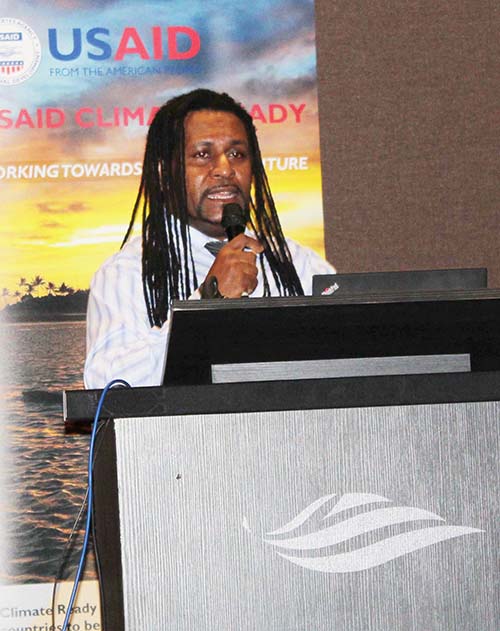Private and Public Sectors Strengthen Collaborations for Increased Resilience
- Home
- Publications
- Private and Public Sectors Strengthen Collaborations For Increased Resilience


Port Moresby, Papua New Guinea (April 13, 2018) – Public and private sector stakeholders in Melanesian countries have been encouraged to strategically use their collective strength to develop practical resilience approaches, and take advantage of opportunities that the upcoming Asia-Pacific Economic Cooperation (APEC) Summit in November represents.
Speaking to participants representing the Green Climate Fund’s (GCF) National Designated Authority (NDA), the private sector, and the Melanesian Spearhead Group Secretariat, Papua New Guinea’s Minister for Environment, Conservation and Climate Change, Hon. John Pundari said he would be facilitating a dialogue during the APEC Summit around realistic economic and financial approaches to the Pacific region’s climate change-related issues.
“Human security is of utmost importance to our region, and especially our Pacific region. Developing guidelines and building resilience of economies and businesses to help deal with climate change and disasters are some of the ways to safeguard our security,” Mr Pundari said.
“The APEC is the perfect opportunity to address this particular challenge…our world is in fact getting smaller. I will take it upon myself to facilitate a dialogue that will help us address our sub-region and regional challenges. It is in opportunities such as the APEC meeting, where the values of dialogue and cooperation are appreciated to bring people, businesses and economies more closely together.”
Mr Pundari said he looked forward to the outcomes of the workshop, as they would form the supporting basis of the decisions that Pacific leaders make on this issue of accessing climate finance for private sector in the Pacific, and fostering public-private partnerships on climate change.
Mr Pundari and the USAID Health Advisor (Pacific Islands) Dr. Jorge Velasco officially opened the one-day workshop attended by 40 participants from Fiji, Vanuatu and Solomon Islands. The Pacific Islands Forum Secretariat and USAID’s Climate Ready Project through Papua New Guinea’s Climate Change and Development Authority (CCDA) convened the workshop in Port Moresby, in collaboration with the Government of Papua New Guinea.
Dr. Velasco said “a shared approach” by governments and the private sector was essential in addressing threats brought on by extreme weather and disasters in Pacific island communities. The Government of the United States had supported Papua New Guinea’s Climate Change and Development Authority (CCDA) to secure more than $1million Kina from the GCF to strengthen the agency’s role as the country’s NDA.
The Pacific Islands Forum Secretariat’s Deputy Secretary-General, Cristelle Pratt said climate change and resilient development was now a prominent agenda for Pacific Islands Forum Leaders, which was being mainstreamed through national development plans and strategies across the region.
Ms Pratt discussed the Framework for Resilient Development in the Pacific (FRDP), endorsed by Forum Leaders in 2016, which outlined an integrated approach to addressing climate change and disaster risk management considerations for resilient and sustainable development.
“Central to this (FRDP) approach is the inclusion of all stakeholders that will need to make up the Pacific Resilience Partnership group, including the private sector (which) will play a key role in building the resilience of our (Forum) Members and communities,” Ms Pratt said.
“More importantly, the private sector represents a key engine for economic development and growth for Forum Members therefore the private sector needs to play a strengthened role in climate change and disaster risk management policy development and access to climate and disaster risk finance.”
Ms Pratt spoke of a critical gap in information sharing and coordination, both between public and private sectors and amongst the private sector themselves; she called on private sector actors to insert their positions in climate change and disaster risk management policy development, and consider ways of accessing climate and disaster risk finance.
Private sector participants from the Solomon Islands, Papua New Guinea and Vanuatu shared examples of domestic public-private partnerships in low-carbon and resilient community-based development projects. GCF NDA representatives updated participants with their respective national progress, reiterating their preparedness to support projects including those still in the pipelines and those around national policy development that would assist private sector investment in climate change actions.
Andreas Lunding, the representative of the GCF Private Sector Facility shared valuable information about the Facility particularly the new Simplified Approvals Process (SAP) that can be accessed for private sector small-scale projects.
Mr Lunding added that the GCF was actively working to strengthen the engagement between the NDAs, private sector and Accredited Entities (AEs) through regional dialogues targeting private sector engagement and country programming, to show private sector opportunities.

Mr. Exsley Taloiburi, Climate Change Finance Adviser at the Pacific Islands Forum Secretariat during his presentation at the meeting..[/caption]
For more information, please email media@forumsec.org


